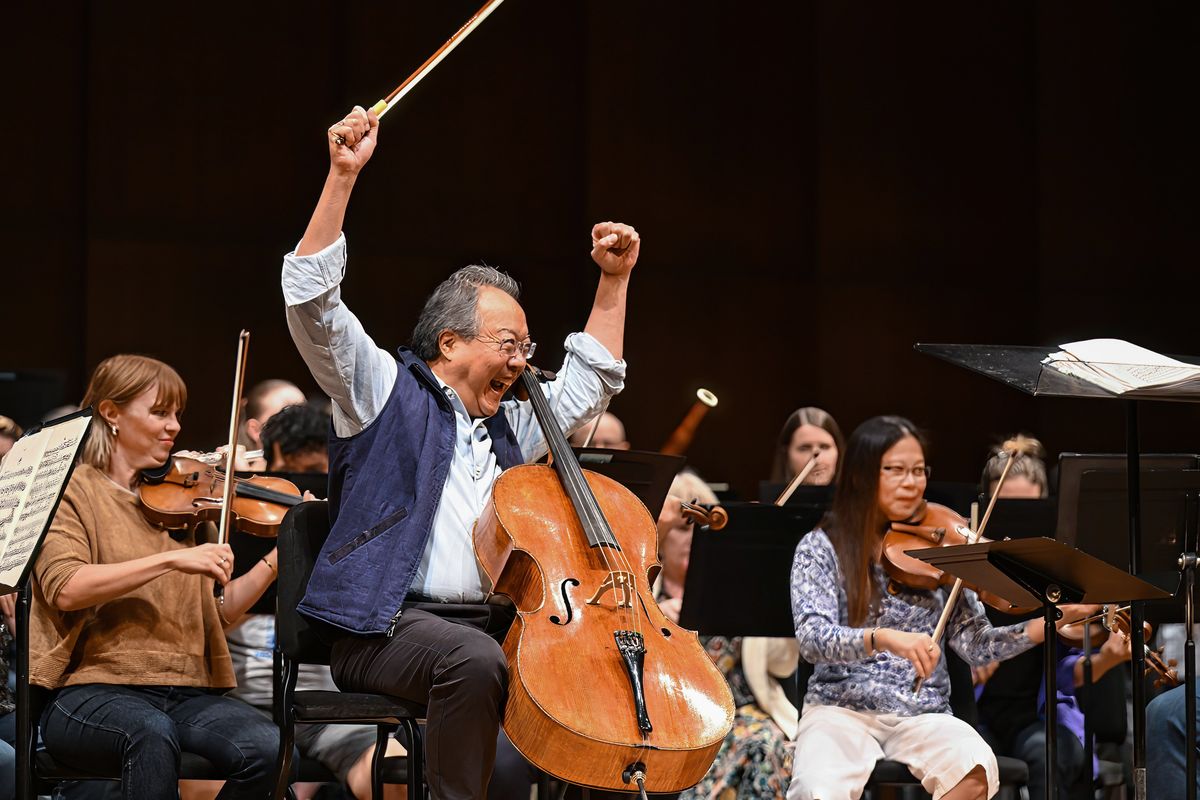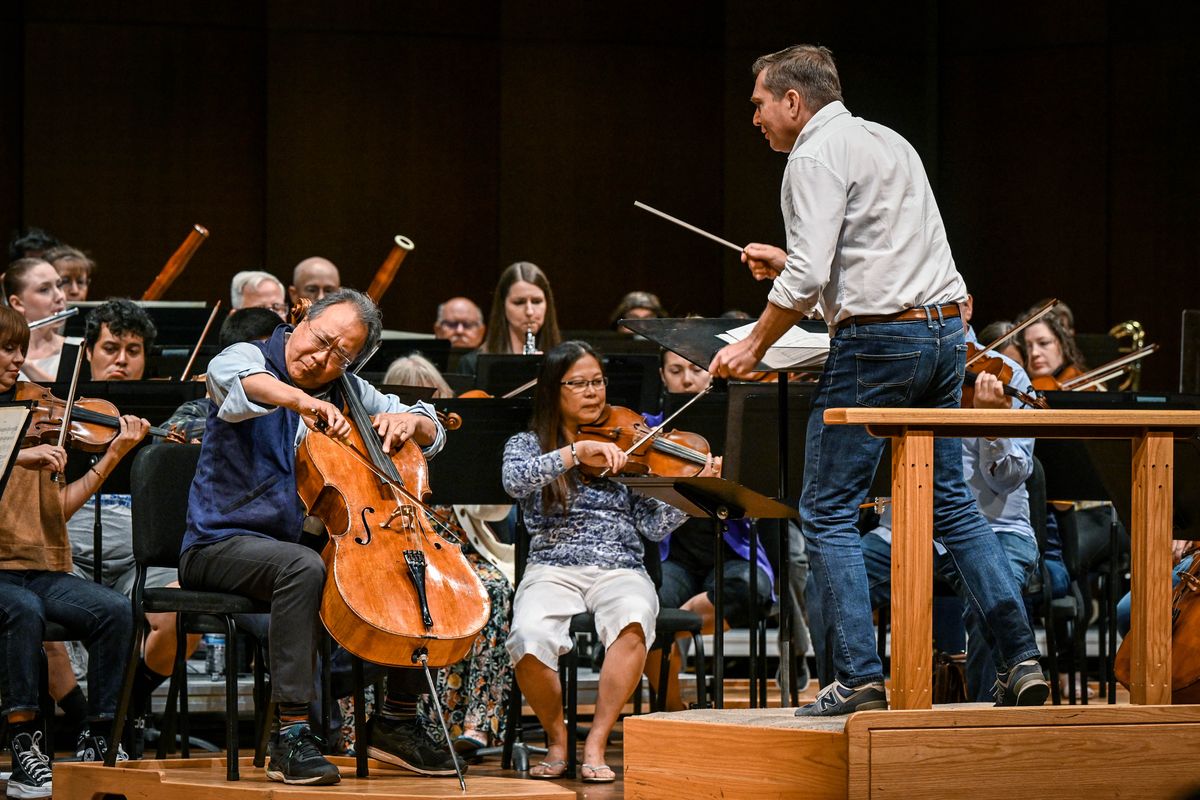Shawn Vestal: Exuberant Yo-Yo Ma spreads joy to symphony, students in Spokane

Fifteen-year-old cellist Owen Peterman put on a white shirt and black tie and showed up looking sharp at the Martin Woldson Theater at the Fox on Wednesday afternoon eager to “see just how amazing a musician can be.”
Peterman and a select crowd of students, donors and lucky others got that in spades when Yo-Yo Ma – world-renowned cellist, humanitarian and generous collaborator – took to the stage to rehearse with the Spokane Symphony in advance of an evening concert.
“The friendliest orchestra in the world!” Ma exclaimed to the crowd of about 40 people, before he sat down with his cello and anchored the kind of performance for which he is internationally famous: passionate and technically brilliant, expressive and joyful. Swaying and smiling and rocking as he played, Ma seemed as swept up in the music as those lucky enough to be watching.
“There are other cellists out there who can play the notes just as well as he can,” said John Marshall, principal cellist in the orchestra. “But he seems to be able to bring out the music behind the notes.”
Jeff vom Saal, the symphony’s executive director, said he’s been working for several years to arrange the appearance by Ma, considered to be among the greatest cellists in history.
“This is likely the highlight of my career right here,” vom Saal said. “He is it. He is the magnum opus. It doesn’t get better.”
Russ Lee, a past board president of the symphony, was president when vom Saal started talking about trying to bring Ma to Spokane.
“Jeff wanted to do something that raises the bar – and this raises the bar,” he said.
Ma’s appearance was a huge get for the symphony, which is still working to recover from a $1 million post-pandemic budget shortfall, and Wednesday night’s sellout performance was a strong kickoff for the upcoming season. The cost of Ma’s visit was covered by three donors: The Johnston-Fix Foundation, Russ and Deborah Lee, and Joan Degerstrom.
The orchestra rehearsed with Ma for its performance of Antonin Dvorak’s Slavonic Dances, Op. 46, No. 1, and Cello Concerto in B Minor, Op. 104, B. 191, as well as Franz Schubert’s Symphony No. 8 in B minor.
Ma, 67, is a singular figure in the music world. A prodigy who began playing at age 4, he has made more than 120 albums, winning 19 Grammys. His oeuvre runs from traditional classical works to movie scores to crossovers with musicians playing a wide range of other genres.
He has won seemingly every award on the planet, played for nine American presidents and been a perpetual ambassador for music and the arts, in addition to humanitarian and environmental causes.
“If Yo-Yo Ma didn’t exist,” the Smithsonian Magazine wrote of him in 2005, “no novelist in the world would have dared invent him. The combination of virtues – musical, intellectual, personal – is simply too implausible.”
For the students like Peterman who came to hear him play, there has never been a time in their lives when Ma wasn’t a towering figure. About 25 young cellists from local schools and colleges got the chance to attend the rehearsal.
“He’s someone we’ve looked up to and wanted to see for such a long time, so having this opportunity is amazing – a once-in-a-lifetime thing,” said Olivia Caputo, a 19-year-old Gonzaga University sophomore.
Caputo and three other cello players who perform in the university’s orchestra attended the rehearsal. They talked about what sets Ma apart from other technically excellent musicians.
“It’s not only the talent and the technique, but whenever I listen to him, he’s trying to communicate a story,” said Ray Womack, 20.
Eva Rugel, a 16-year-old North Central High School student who plays cello in the Spokane Youth Symphony, said what distinguishes Ma is “his understanding of the music. A lot of people can be good at playing, but you can’t feel the emotion in their music. I think it’s different with him.”
As good as Ma’s playing was during the rehearsal, it was his joyful exuberance and generosity of spirit that many observers commented on afterward.
Helen Byrne, the assistant principal cellist, noted how much Ma communicated, via gestures, smiles and expressions, with the other musicians during the rehearsal, showing appreciation for their playing and emphasizing his participation in the ensemble.
“He instantly puts you at ease,” Byrne said. “You feel given permission to play.”
Marshall echoed that.
“There’s something in him that exudes musicality, and it spreads to the rest of us,” he said. “It’s infectious, in a good way.”
After the rehearsal, Ma embraced the other musicians, posed for reams of selfies and spent time talking to the clearly enthralled students.
“You play cello?” Ma asked one young man as the students crowded around him. “How could I tell? You’ve got that cello look.”
He told the young players to consider performing in a group as akin to being a part of an organism.
“It’s like a fungi – somehow the energy is shared,” he said.
Asked for his advice, he said, “Enjoy it. It’s your gift. It’s a gift that keeps on giving. … If you think of the cello as your friend, you’ve got a friend for life.”
Peterman, who came to see just how amazing a musician can be, said he found out.
“It was really amazing,” he said.
